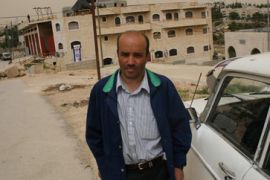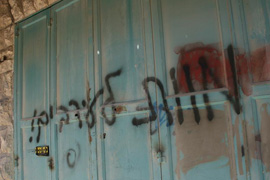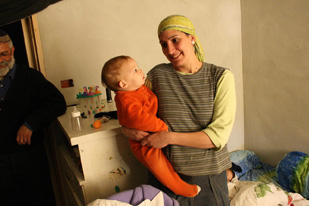‘Peace house’ harms Palestinians
A new Jewish settlement in Hebron adds further restrictions for local Palestinians.

|
|
| Sarit Weinberger says living in her new apartment is a religious duty |
A group of Israeli soldiers sit underneath webbing next to a large new building on the road into H2, the Israeli-controlled area of Hebron in the southern West Bank.
Their job is to protect the apartment block that represents the newest Jewish settlement in the city.
It is a hive of activity as young settlers pour in and out with tools, dividing the 3,500sq.m of space into small flats to accommodate scores of new families.
For the settlers, the new building nicknamed Beit HaShalom (Peace House) is a vital strategic asset aimed at entrenching the Jewish community in Hebron, a city holy to both Muslims and Jews.
For the Palestinians it is another blow to their hopes of a state. It defies the Israeli government’s stated aim of carrying out a partial disengagement from the West Bank following the withdrawal from the Gaza Strip in 2005.
David Wilder, a New Jersey-born settler who has been in Hebron for 25 years and whose daughter is moving into the Peace House, says “of course there cannot be a Palestinian state. A child can look at the map and see that it would be suicide for Israel.”
While all the West Bank settlements are illegal under international law, the Peace House has also been deemed illegal under Israeli law.
‘Higher law’
It was bought for $700,000. However the settlers did not obtain the necessary permit to buy from the Israeli Civil Administration, which runs the West Bank.
Under Palestinian law, selling property to Jews is punishable by death and Palestinian police have arrested a man in Jericho in connection with the sale.
However, Sarit Weinberger, who is moving into a small one-bedroom apartment in the new building with her husband and child, says the settlers are obeying a higher law.
“We have a religious duty to live everywhere in Eretz Israel. I don’t believe in the ministry of defence – I believe in God,” she says.
Eretz Israel means what is now Israel plus the occupied territories of the West Bank and the Gaza Strip.
 |
| Many Palestinians shops are daubed with graffiti in Hebrew |
But while the 700 Jewish settlers in H2 are able to live normal lives, the 20,000 Palestinians who live alongside them suffer severe restrictions to their freedom of movement and complain that settlers harass them with impunity.
Bassam al Jabary, a 41-year-old Palestinian who lives next to the new settlement, says the settlers threaten and menace many of his compatriots.
“They throw stones and rubbish at us, attack our children and shout insults. It is no longer safe for us to let our wives and children go out after about 6pm. And the Israeli soldiers and police stand and watch. Even the settlers’ dogs have more rights than us,” he says.
According to Hisham Sharabati, who edits the local Rassala Al Khalil newspaper “the city is tense all day long. If there is an attack on Jews somewhere in Israel or Palestine, the settlers take revenge on the Palestinians of Hebron.”
“They go on the rampage,” he says.
Observers from the Temporary International Presence in the City of Hebron (TIPH), set up to monitor the human rights situation in the city, say reports of attacks and harassment by Israeli settlers had increased around the Peace House.
No through road
To try to keep the settlers and Palestinians as separate as possible, the Israeli authorities have banned Palestinians from driving on many roads and even from walking along one stretch of road.
Those with houses on Shuhada (Martyrs) Street, adjacent to the settlement, must instead exit from the rear of their buildings and crossing the road entails a journey of several kilometres.
“The ban on Shuhada Street is an oral order of the kind I used to give out myself – it isn’t written down because it is not really defensible under Israeli law,” Mikhael Manekin, who served as a soldier in Hebron and now works with the group Breaking the Silence, which gives former soldiers the chance to talk about their experiences.
As a result, about 10,000 Palestinians have left H2, their boarded-up shops now daubed with slogans such as ‘Death to the Arabs’.
But none of this concerns Sarit Weinberger who says matter-of –factly, “the Arabs – I don’t see them”.
A standard-issue Israeli army short M16 assault rifle leans against the wall of her apartment. All the settlers are armed, which they say is necessary to protect themselves against attack.
But these days it is the Israeli government that represents the main threat to their lifestyle.
The Hebron settlers are deeply unpopular with many Israelis following incidents of harassment of Palestinians caught on film and shown on Israeli TV.
Withdrawal doubts
And Hebron is on the Palestinian side of Israel’s West Bank Barrier, which has been openly referred to by some Israeli politicians as the future border of Israel. In such a scenario, the Hebron settlers could find themselves facing eviction.
“I am concerned about this. After Gush Katif [the withdrawal from the Gaza Strip] a lot of people who thought it couldn’t happen saw that it did,” Wilder says.
“But I don’t think they will do it. Many thousands of Jews visit the Tomb of the Patriarchs here every year and I think a majority would oppose closing down Hebron.”
Events suggest Wilder’s confidence is not misplaced, at least in the short-term.
Amir Peretz, Israel’s defence minister said he would evacuate the Peace House shortly after it was occupied, but nothing has been done and Peretz is now battling to save his career following criticism of the way Israel handled last summer’s Lebanon war.
“The Israeli government is too weak to take on the settlers. And the Palestinian Authority can’t do anything,” Sharabati says.
Meanwhile, the settlers have now occupied the building for more than a month, meaning the Israeli authorities need a court order to evict them.
And despite their unpopularity, the religious settlers exert a kind of moral authority over more secular Jews, according to Ilan Lonai of Amnesty International.
“They make us feel guilty that we are not good Jews. They say we should first be proper Jews before we tell them what to do,” he says.
And there is also the threat of violence. In the wake of the Gaza withdrawal, younger West Bank settlers have become increasingly militant and say they will use force to resist evacuation.
In Hebron, Wilder said that there would be little the settlers could do if the authorities chose to evict them by force.
But 19-year-old David Cohen from Meitar in southern Israel had a different opinion.
“If the authorities don’t come carrying big bats we won’t do anything to them,” he said.
“But if they do come armed then we will have to protect ourselves.”
